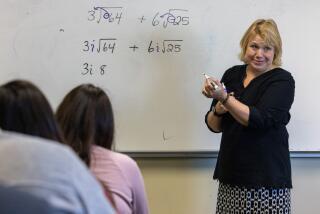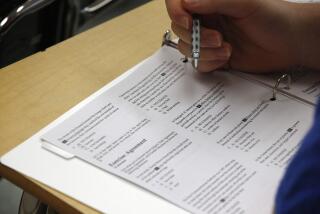Can’t Change Aptitude Test to Stress Statistics
- Share via
The College Board has long shared the concerns of Michael Schrage and others about the need for better and earlier instruction in statistics and probability, “Statistics Skills Would Help U.S. Compete” (March 14), and applauds the efforts of the National Council of Teachers of Mathematics to encourage such instruction. The board is also acting on those concerns.
For example, the Student Aptitude Test already contains questions that draw on basic concepts in statistics and probability, reflecting the board’s own recommendations about what should be included in the college preparatory curriculum.
Among those recommendations, developed in 1983 by school and college specialists and disseminated in a series of publications, is one calling for students to “be able to use elementary concepts of probability and statistics.” As we develop the new SAT for introduction in the spring of 1994, we will continue to consider test content specifications in light of concepts taught in basic mathematics classes and the recommendations of NCTM and other professional associations.
However, we cannot transform the SAT into a test of “statistical literacy,” as Schrage recommends. The SAT must be appropriate for all secondary school students, some of whom do not have the advantage of formal study of statistics. Also, such a test would be an achievement test--not a test of reasoning abilities.
The difference is more than semantic. An achievement test determines the degree to which a student knows a specific subject such as French, biology or history. The SAT does not assess how much arithmetic, geometry, algebra or statistics a student knows, but whether he or she can solve problems by calling upon a variety of skills learned in basic courses.
To encourage statistics instruction in secondary school, and in response to suggestions from the mathematics community, the College Board is investigating the possibility of adding a course and examination in introductory college statistics to another of its projects--the Advanced Placement Program--which recognizes those students who accomplish college-level work while still in secondary school.
FREDERICK DIETRICH
The writer is vice president for guidance, access and assessment services at the College Board in New York.
More to Read
Sign up for Essential California
The most important California stories and recommendations in your inbox every morning.
You may occasionally receive promotional content from the Los Angeles Times.













